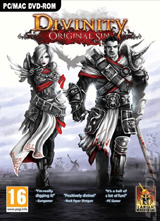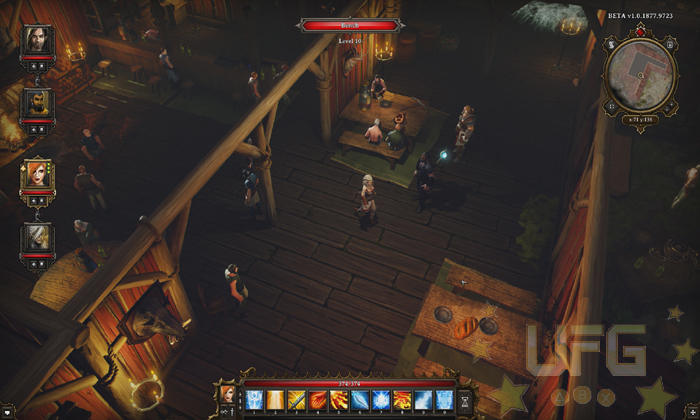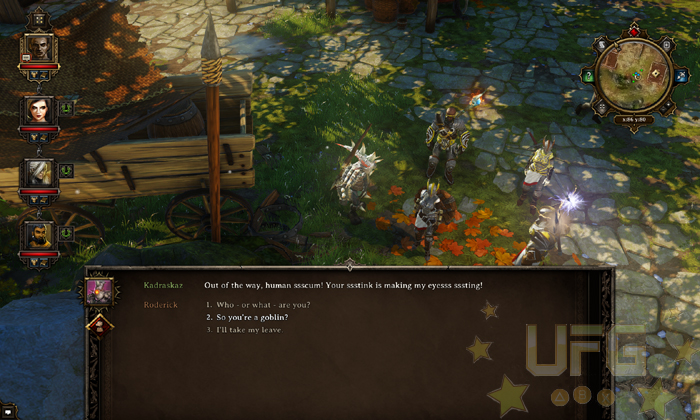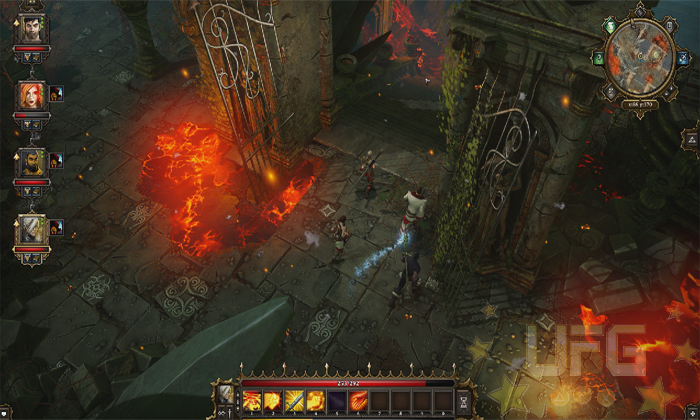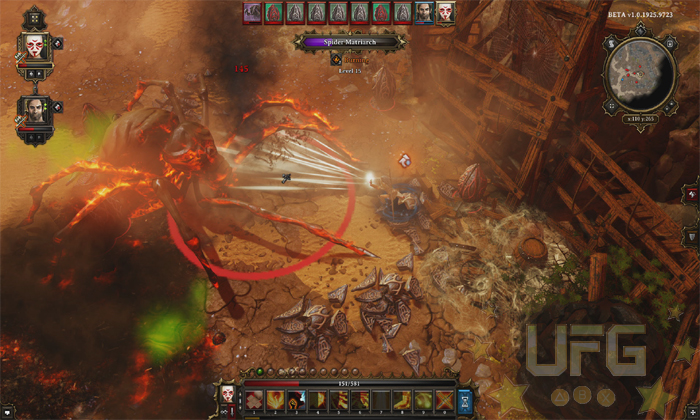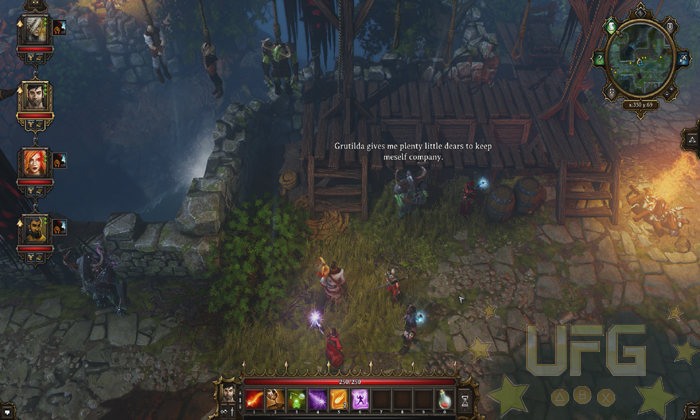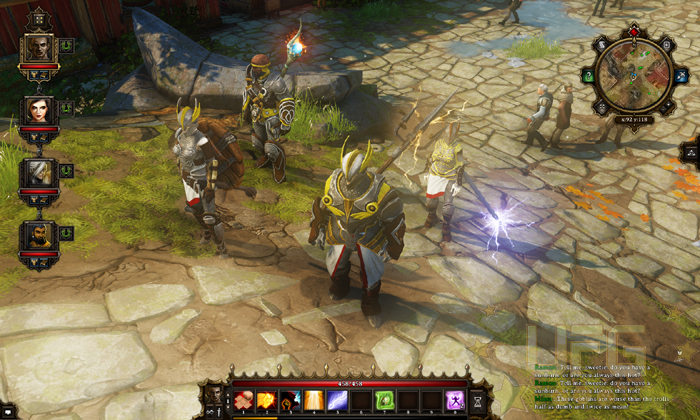Divinity: Original Sin
As of this writing, I’ve spent about forty hours in Larian Studios’ Divinity: Original Sin. I’ve slain all sorts of vile creatures, saved innocent townsfolk from an evil cult, and scavenged incredible loot, all while delving into a well-written and intriguing story. I was essentially lost in Original Sin’s world, totally disregarding any other video game sent my way. And though I immensely enjoyed my stay, after the hours I put in, no one would blame me if I decided to move onto a new title…
What’s interesting is how much I didn’t like Original Sin in the beginning. Before I go into why, let me back up and explain the premise. Original Sin’s story takes place in Rivelon, years before the events of Divine Divinity (the first game in the series). A magical energy called the Source has been plaguing the world for some time now. Though it was once used for good, those who come in contact with this power are usually corrupted and/or manipulated into using it for evil. Taking on the role of two Source Hunters, it’s your job to rid the world of this magic before it can corrupt more people. Unfortunately, it’s already too late for some; a high-ranking official has been murdered and there are rumors that a “Sourcerer” (a sorcerer in Divinity terms) had something to do with it.
What follows is a murder mystery that turns into something, quite literally out of this world. I don’t want to go too far into what happens, especially since the slow reveal is part of the fun. I will, however, say that the story isn’t what I expected. Sure, there are some cliché elements and complicated story beats to get through. But for the most part, the game’s plot is rather refreshing; it isn’t a convoluted mess or just plain boring like what’s found in some more recent RPG’s. The icing on the cake was the manner in which your choices where incorporated into the game; your choices would alter the course of the story in small but meaningful ways. Things like deciding if a starving father is jailed for stealing food for him and his family, or choosing to fight your enemy when all attempts to reason with them have failed, will all have ramifications throughout your journey. There was one point in the game where I angered a suspect by accusing them of knowing more than they were telling me; I knew they were involved but didn’t have enough evidence to pressure them into talking. This resulted in them not liking my male Source Hunter and clamming up whenever he was around.
Adding to this is the fact that each Source Hunter has a say in how your plans are carried out. If you choose to have your two characters concur they will execute your agreed upon plan. However, if you choose to have them disagree then a mini-game (rock, paper, scissors) will pop up to pick who’s right. The ability to have two characters share in the major responsibilities laid upon the gamer, yet can have different opinions is interesting. Granted, it would be great if one of them was controlled by the game and not you, which would lead to more realistic disputes. The difference in opinion can lend itself well to the development of the story though. As in the case with the angered suspect, by splitting up my party and having my female Source Hunter talk to him, I was able to get more information. He ultimately didn’t trust me enough to spill everything, but it was cool to be able to play bad cop good cop during my investigation.
I would highly suggest exploring all the lore available to you, whether it is dialogue from an NPC or the scribbling’s hidden deep within an ancient tome. I say this because the game is rather lax about helping players along. The idea, I believe, was to go back to older RPG staples where players had to actively search for their objectives; there is no floating marker indicating where to go next for instance. This goes back to my initial displeasure during my early hours of play – I felt that Larian was a bit heavy handed in making the game difficult. To give an example, one quest objective was to discover what happened to a group of soldiers that were sent to investigate an old lighthouse. Their commander explained how it had been days since he heard from them and that we ought to hurry. However, he wouldn’t tell me where to locate said lighthouse. Despite having multiple threads of dialog to pull from and several response options for each of these, I wasn’t able to get a simple “head north” from him. And while it may seem easy to just head for the coast, the fact that the town was basically on a peninsula made things worse.
Walking around and searching for the right places was tricky at first given the fact that it was possible to wonder into enemies that were way above my current level. There were some places that were closed off, requiring me to have already learned a particular skill or hit a particular level to tread safely. Most of the environments were open for exploration though, which lead to my entire group being slaughtered; the land is covered in shadow/fog of war and will only reveal itself once the player has visited that particular area. So, in a lot of cases, I wasn’t sure what was waiting for me through the fog. Now, I don’t mind not having a waypoint that tells me exactly where to go. And to be fair, there were signs posted that would sometimes point me in the right direction. But it can be frustrating not knowing where to go and then end up running into a boss you weren’t meant to fight yet as a result.
Talking to everyone you meet including your party members, reading the books you find, paying attention to the details – all of these things are imperative if you want to progress through the game. Those of us who like to skim through dialogue trees to get to the action will find themselves rereading them for clues on what to do next. The good news is that the story elements aren’t boring. There’re even some rather humorous moments sprinkled into the writing. Initially though, this “issue” and the omission of other helpful game mechanics made Original Sin tough to get into. Especially since the combat mechanics can be so unforgiving. A lot of the adventuring is done from a top-down view, similar to how Divine Divinity was played (think Diablo). However, when you run into an enemy a turn-based battle is initiated. Strategy is the name of the game at this point as a poorly planned move often resulted in a quick death.
Like other turned based games, each party member and enemy is shown on a time bar at the top of the screen. The faster characters will be closer to the front of the line, meaning they’ll get their turns before the others. During a turn, a character can move, attack, heal, summon a creature, etc. What they do is mainly decided by what’s happening on the battlefield as well as how many action points they have. Each “action” requires a certain number of points. For instance, walking over to an enemy may use four points (walking points are distance-dependent), while attacking your opponent at close range may use five points. So to complete both moves you’ll need nine points total. If you decide not to use all of your points during a turn, they’ll be saved and added to the amount of points given to you in the next turn. This will of course allow for more options later in the fight.
How many points you have and your positioning on the battlefield are just two of the many things to consider. You also have to consider the battlefield’s condition. Standing too close to an oil barrel could end in disaster if a goblin sourcerer flings a fireball your way. At the same time, using a telekinesis spell to pick up the barrel and drop it on your enemies would cover them in oil. Not only will they be slowed, lowering the amount of points they have to spend for a few turns, but if you land a fire attack on them, the resulting explosion could kill them and anyone else nearby.
Now that I’ve explained how things worked and why I wasn’t enjoying the early hours of play, I can explain why the game is so great. For one thing, I learned that though the game is difficult, it’s also completely fair. For once, in my years of gaming, I’ve finally found an RPG where the difficulty is regulated by the rules that were established early on. There are no super bosses that are immune to every debuff in your arsenal or super quick enemies that are allowed to attack an absurd number of times before letting you counter. Even the roll of the die – the thing that calculates the misses, hits, damage dealt etc. – is handled logically; how to approach certain enemies should be apparent after spending a few hours in-game. If you’re fighting a fire giant, using a spell that sets them on fire isn’t very smart. However, creating a thunder storm would be, since the rain would help extinguish their flame or at least make it impossible to set you on fire. Zombies will be immune to poison but can be crippled (losing limbs), skeletons are immune to bleeding but take more damage from blunt weapons and so on.
Going back to how things are fair, even when the AI has gotten the better of you it doesn’t mean you’re going to lose the fight. For instance, after creating a storm to put out a fire, my group was wet (you know, from standing in the rain). This allowed an enemy to cast a freezing spell on one of my heroes, turning them into a block of ice. Of course, I was afraid of what might happen to them due to the fact that they weren’t going to be able to move for the next few turns. That said, I was shocked to see that rouge wizard’s freeze spell backfired. You see, I was standing in a puddle right before getting frozen which, in turn, also froze. When another bad guy ran up to attack me after being frozen, he slipped on the ice from the puddle. This disadvantageous move not only cost him a turn regardless of his unspent points, but also caused him to fall and remain on the ground long enough for my companions to gang up on him.
Another thing l liked was the sense of discovery. Sure, it was a pain to find the lighthouse in the beginning. However, after learning how to look for clues, I was able to get a better understanding of my surroundings when searching for a particular place. Studying the details of any environment will give you hints at what previously transpired there. This usually results in a party member making a remark about what they are seeing. A trail of bodies all wearing the same armor that belonged to the commander’s men could mean I’m on the right path. Further observation could reveal more; like one of them holding a note explaining what direction they were headed in before being ambushed. Though I think it’s odd that no one in town knew where their lighthouse was, it still felt good to find it on my own.
There is a lot to like in Divinity: Original Sin. So much so, that I fear my review would be too long if I talked about each (awesome) feature in full detail. In other words – the voice acting, music, graphics, story, and combat mechanics are so great that it’s easy to overlook my minor complaints. I didn’t even get into the highly robust toolset that allows gamers to create their own adventures and share them online, the flexible character creation options, or the inclusion of cooperative play where each player controls a Source Hunter. Again, I was essentially lost in Original Sin’s world, totally disregarding any other video game sent my way. And while I immensely enjoyed my stay, after the hours I put in, no one would blame me if I decided to move onto a new title. The fact is though, that if it wasn’t for my other obligations on the site, other interesting games to play and well…my responsibilities as an adult, I’d probably spend most of my waking hours playing this game!
Gameplay:
10
If you can get over the tough first few hours, you’ll find that Divinity: Original Sin is one of the best RPG’s on the market.
Graphics:
9
Though the game doesn’t have the best visuals on PC, it certainly has an impressive level of polish given Larian’s highly detailed environments and character models.
Sound:
10
The music and sound effects were well done. And though there isn’t much voice work presented, what is here is awesome!
Gameplay:
10
I haven’t stopped playing…
Final Score:
9.8
